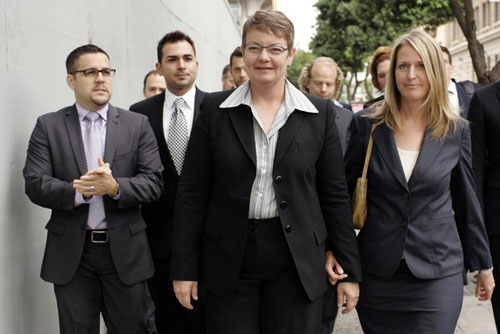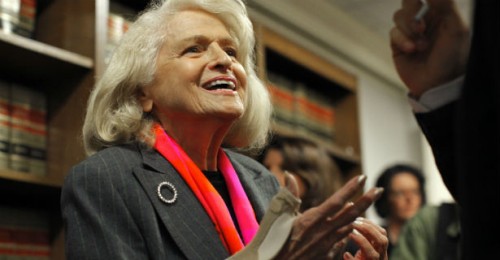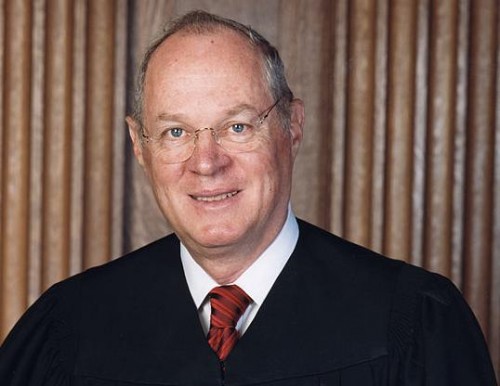IN MARCH OF 2013 the Supreme Court will hear oral arguments in the cases against the Defense of Marriage Act, signed into law by Bill Clinton in 1996, and California’s Proposition 8 which was voted on and passed in 2008. The Supreme Court is expected to issue a ruling by June. For the LGBT community, this means several months of hopeful anticipation or dreadful anxiety or both – but it should be a cause of nationwide concern
The Defense of Marriage Act (or DOMA) defines marriage as the legal union of one man and one woman. The law declares that the states are not required to recognize same-sex marriages from other states. It also expressly indicates that same-sex marriages cannot be recognized for insurance benefits, Social Security survivors’ benefits, immigration, and the filing of joint tax returns – specifically, federal benefits that apply to opposite-sex couples.
Proposition 8 (or Prop 8) amended the California State Constitution in a more restrictive way at the state level, preventing marriage between same-sex partners and overturning a State Supreme Court ruling which deemed Prop 22, a year-2000 het-only marriage law, unconstitutional. Both propositions essentially did the same thing except that when the earlier one, Prop 22, was struck down by the State Supreme Court in 2008, California’s state constitution did not restrict marriage. Prop 8 was then put immediately on the ballot for the fall election and was passed by the voters. But between the times that Prop 22 was overturned and Prop 8 was passed, hundreds of same-sex couples had taken advantage of the brief window which allowed them to marry in California. Prop 8 was not retroactive so it did not affect same-sex marriages performed before Nov 2008. (Confused yet?)
Basically, California has a bunch of married same-sex people who, whenever they want to do something that involves being married, now bear the burden of proving that they were married during that brief window in 2008. Except, you know, for collecting married person federal benefits, which they can’t do anyway because that is prevented by DOMA.
The specific cases being brought before the highest court involve two separate challenges. The Advocate reports:
The Prop 8 case challenges the California ballot initiative that overturned marriage equality in 2008, while the DOMA challenge concerns [Edie] Windsor, an 83-year-old from New York who was forced to pay more than $360,000 in estate taxes because the federal government did not recognize her marriage to her late spouse, Thea Spyer.
If the US Supreme Court strikes down Prop 8, the ruling would have essentially the same effect as 1967’s Loving v. Virginia (aptly named), the landmark case which declared “Virginia’s anti-miscegenation statute unconstitutional” and ended “race-based legal restrictions on marriage in the United States.” (Thank you for that handy explanation, Wikipedia.)
The DOMA case is a little more complicated. Edie Windsor and her legal team are challenging the provisions in DOMA. When her wife, Thea Spyer, died, Ms. Windsor was forced to pay nearly half a million dollars in estate taxes because, under DOMA, the U.S. does not recognize their Canadian marriage. Married persons do not have to pay an estate tax. “If your spouse is a U.S. citizen, you can leave any amount to him or her with no federal estate tax hit. If you are a U.S. citizen, your spouse can do the same.” DOMA restricts those benefits to opposite-sex couples. Ms. Windsor has a strong team behind her: Paul, Weiss, Rifkind, Wharton & Garrison LLP; the American Civil Liberties Union; the New York Civil Liberties Union and the Stanford Law School Supreme Court Litigation Clinic.
Together the challenges to these two laws could usher in a new era in civil rights in the United States and while they may not seem immediately to affect 100% of citizens, the implications of both as they stand should give everyone pause. DOMA effectively nullifies the core idea of our nation which is that all men are created equal. So nullified, states are free to discriminate. DOMA can be likened to Jim Crow laws, to anti-sodomy laws, laws against women’s suffrage, and the prohibition of interracial marriage, except it was passed on a Federal level. Opposition to Prop 8 and DOMA collides with two widespread “ideas” – the first is that homosexuality is a choice and therefore completely unlike racial discrimination and the second is the belief that the bible dictates US law.
An article from the December 10 Bloomberg news reports:
Supporters of [DOMA] say it promotes traditional marriage — and by extension makes it more likely that children will grow up in a nurturing environment. ‘Traditional marriage protects civil society by encouraging couples to remain together to rear the children they conceive,’ 15 states led by Indiana argued in court papers. ‘It creates the norm that potentially procreative sexual activity should occur in a long-term, cohabitative relationship.’
There are a lot of assumptions in that argument. So many that I can hardly believe it is being put forth by a law team without irony. Let me translate for you:
The purpose of marriage is to raise children. Children are best nurtured by straight people, who never discourage, abuse or damage their kids. Opposite-sex marriages never end in divorce but if straight people have to share their rights, they will start divorcing and leaving homeless children on the street. Plus, homosexuals are physically incapable of creating babies.
Regarding that last bit, let’s just say that my boy-parts work just fine, as any of my lovers will tell you. Gay men and women aren’t magically made sterile as soon as they come out of the womb so arguments for marriage as a family planning service fall on deaf ears with me, and they should with our Supreme Court. Marriage is not about making babies. It’s about a commitment to your partner. Raising children is sometimes a by-product of the love between two people. And sometimes married people can’t have babies with regular ol’ sex so they are free to choose other means like adoption, surrogate planning, fertility drugs and the purchase of someone else’e sperm or ova.
DOMA and Prop 8 are bias laws without basis in the U.S. Constitution. Lower courts have already pointed out that in both State and Federal Constitutions, marriage is not restricted to men and women and the Federal Constitution guarantees nationwide equality for all. Just because California changed its Constitution, doesn’t make it Federally constitutional – and that is what is being questioned in the Prop 8 case.
Lest I repeat myself, I’ll point out that my October essay in The Weeklings, “On Homophobia: The Elephant in the Room,” addressed issues raised by Lawrence v. Texas, the landmark 2003 Supreme Court case which struck down anti-sodomy laws. Justice Anthony Kennedy, who wrote the majority opinion on that case, has been called a “libertarian conservative” as opposed to Antonin Scalia who is a “social conservative.” Kennedy has largely looked to the Constitution to maintain individual freedoms while Scalia believes law can legislate morality. (And there’s another assumption: that homosexuality is immoral.)
Speculation is brewing about which way Justice Kennedy will vote since he has proven himself conservative on some issues but liberal on others. Scalia says the US Constitution is “dead, dead, dead, dead.” That’s four deads. Even though the Founding Fathers made provisions for amendments, which they knew we would need as the country grew, expanded and moved into the future. If Scalia believes the Constitution is “dead, dead, dead, dead,” (Yes, he actually said that) where does he compartmentalize Article V of our Constitution which provides for the proposition and ratification of changes or, in other words, amendments?
On December 10, 2012, Scalia spoke at Princeton University where he defended his likening of homosexuality to murder. New York Magazine reports:
During the question and answer session, freshman Duncan Hosie asked Scalia why he’s equated laws that ban homosexuality with those that outlaw bestiality and murder in his legal writings. “It’s a form of argument that I thought you would have known, which is called the ‘reduction to the absurd,'” snapped Scalia. “If we cannot have moral feelings against homosexuality, can we have it against murder? Can we have it against other things?”
Mary Elizabeth Williams in Salon responded: “If we do not want anchovies, do we not reject pepperoni as well?”
We could call Scalia’s argument an example of reductio ad absurdum which is, according to Merriam-Webster, the “disproof of a proposition by showing an absurdity to which it leads when carried to its logical conclusion.” The problem is that the absurdity of Scalia’s response is kind of like a line from an experimental play. How do we get from homosexuality to murder? How do we get from disapproval of a consensual act between two adults to THE TAKING OF SOMEONE’S LIFE?? Maybe we can make sense of Scalia’s “logic” by dramatizing two events which breathe life into his debate points. Let’s imagine the two scenarios he equates – consensual relationships and murder. We’ll imagine this between straight people, just in case you can’t get beyond the idea of same-sex snogging. First, the consent:
JIMMY: Hi, want to go on a date?
SUSIE: Sure, I’d love to. Where?
JIMMY: My bedroom.
SUSIE: Sounds hot. I’ll bring wine and take-out. You bring you.
You get the idea. Now for the non-consent:
JIMMY: Hi. I’m going to murder you.
SUSIE: Please don’t. I want to live. Why are you doing this? You don’t have to do this. Please don’t kill me.
In the first example Susie wants some hot action with Jimmy. She responds in the affirmative when Jimmy makes a lewd suggestion. In the second example Susie’s life is in danger and she pleads for it. In other words, she doesn’t want to die: consent vs. Non-consent. Scalia’s reductio ad absurdum is not only absurd, it’s stupid. There is no argument to be made comparing consensual relationships to murder. This sounds more like reactionary hyperbole than legal logic. Scalia wouldn’t even have made it into my high school debate club.
There is also the argument that the Constitution does not explicitly enumerate the right to same-sex marriage, but that should be easily countered with the profoundly simple Ninth Amendment:
The enumeration in the Constitution, of certain rights, shall not be construed to deny or disparage others retained by the people.
Eleven countries (Argentina, Belgium, Canada, Denmark, Iceland, the Netherlands, Norway, Portugal, Spain, South Africa, Sweden) recognize same-sex marriage. Conservative pundit George Will believes, “… opposition to gay marriage is dying. It’s old people.” I don’t entirely agree with him – there are plenty of young people who are opposed to it as well. Though I haven’t encountered any of those types in New York City, there are plenty of them on message boards and comment threads across the Internet. But they should be afraid for their civil rights when one group of people is denied something a privileged group takes for granted. If same-sex couples are denied a right to marry, based on the specious arguments that marriage has always been between one man and one woman or that the majority prefers gays not to marry, the rights of ALL citizens are in danger. If the majority can oppress the minority, simply by matter of opinion, no one is safe because everyone is a part of some minority.
Fear for yourself if the Supreme Court does not follow its own precedents on matters of civil rights. I repeat this quote from my previous entry. It cannot be said too often.
The great danger in republics is that the majority will not respect the rights of minority.
– James Madison, fourth President of the United States






